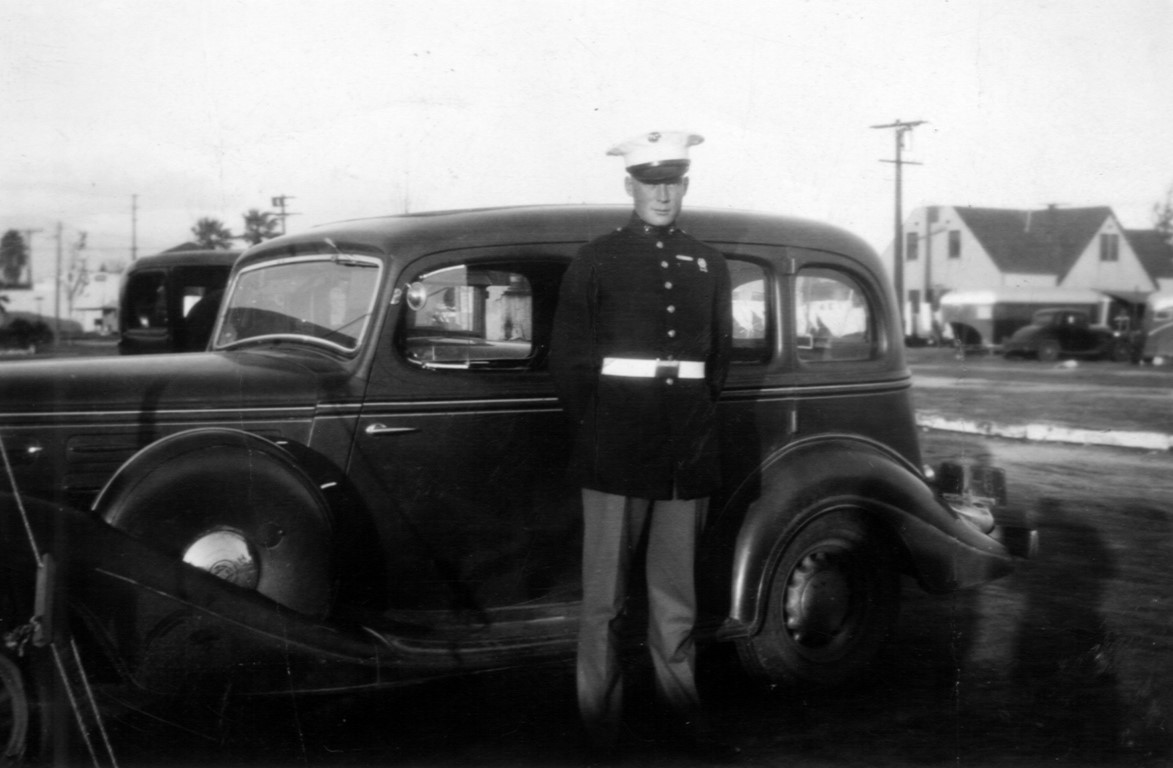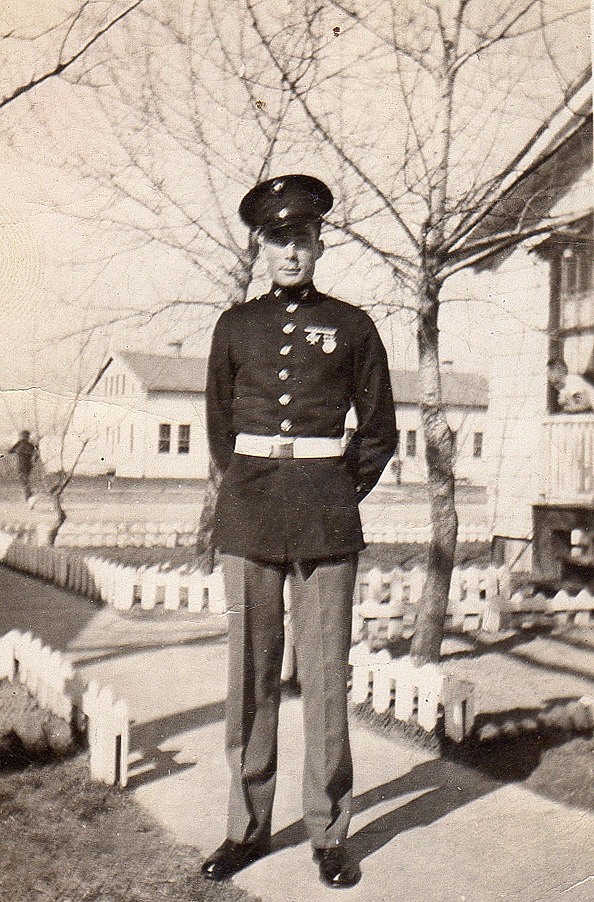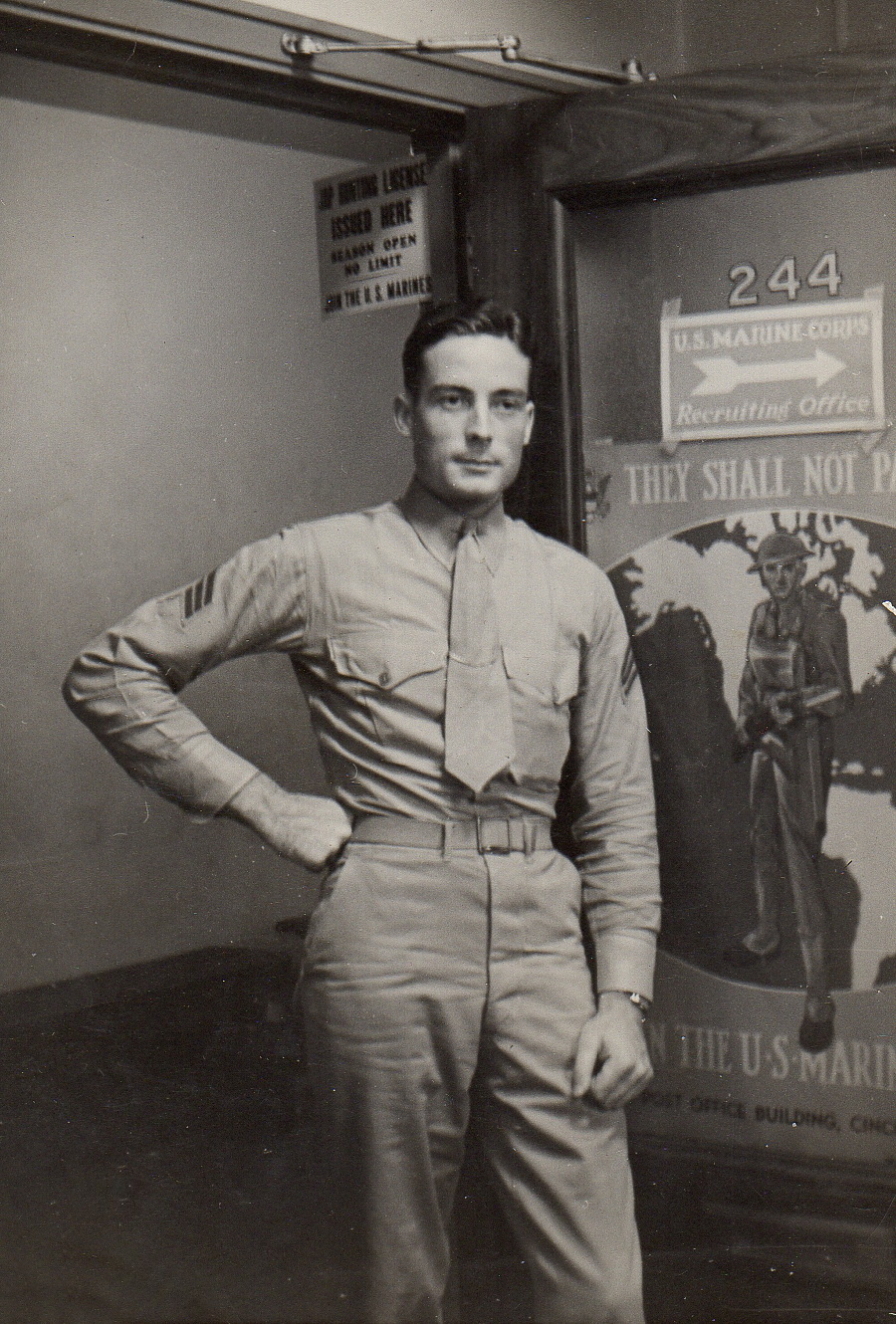RBT's Personal Journal
1938-1941 - Naval Prep School to WW II - Pearl Harbor
1938
23 Sep, 1938 - Naval Academy Prep School

RBT with 1934 Hudson
[click to enlarge]
On 23 Sep, 1938 I was transferred to San Diego Marine Recruit Depot for transportation to the Naval Academy Prep School at the Naval Operating Base, Norfolk, Virginia. The couple of weeks I was at SD I did guard duty in an armored truck transporting payroll from the bank to the Marine Base, armed with a shotgun.
I also helped in the Marine Corps Recruiting booth at the Los Angeles County Fair in Pomona for about a week.
Herb Zastrow (the only other Marine selected from the Pacific Fleet) and I were sent by train to the East Coast. Fortunately, the navy transport wouldn’t get us there in time, so we had to be sent by train. The Sergeant Major bawled us out for what our transportation, meals, and sleeping accommodations cost. Herb and I, dressed in our blues, carrying our sea bags and rifles, were quite an oddity on the train and transferring between train stations in Chicago.
Prep School was for nine months with classes from 8AM to 5 PM, Monday - Friday, and Saturday to noon with study hall Sunday evenings. It was a very demanding schedule with excellent Navy officer instructors. If our grades were OK we were granted liberty on Saturday afternoon until 10 PM, and again on Sundays from 8 AM until 6 PM. No liberty on Sunday if our grades weren’t acceptable.
US Naval Academy
After taking the entrance examination for the US Naval Academy in June we were given leave. I got a ride to San Antonio, Texas with three sailors. From Norfolk we took a southerly route on mostly gravel roads with very few road signs. There were no major freeways. I couldn’t believe the poverty and the shacks the blacks and many whites lived in. After we arrived at San Antonio I stayed two nights in Army Barracks at Ft. Bliss.
While trying to get flight to LA. I saw a parade of an Army Cavalry Division. It could have possibly been one of the last full scale Cavalry Division parades. In my dress blues Army GIs were saluting me; they didn’t know what I was. Caught a ride on an Army bomber and flew to March Field (Army Air Base) occupying the bombardier’s seat in the nose of the plane. Don't remember type of bomber but it had only two engines. Do not recall that they even gave me a parachute. In fact, I’m sure they didn’t. Sitting in the bombardier’s seat and not flying at a very high altitude it was fun to get a bird’s eye view of the desert, rivers and mountains as we came into California. The landing was especially a thrill with nothing in front of me but the glass of the cockpit as the land came rushing up at me. I am sure after the flight that I might have tried to get into aviation, if I hadn’t promised my mother that I wouldn’t. The bus ride from March Field to LA to visit family took longer than plane ride.
After a week’s visit in LA my mother, Aunt Laurel, Uncle Clarence Woodburn, and cousin Ruth Woodburn Olson with her baby and I drove to Montana in his air-cooled Franklin. It was a long, hot and crowded trip.
After several days visiting in Lewistown I received a telegram that I had failed the entrance exam to the Naval Academy by two-tenths of a point in Math, and my leave was cancelled. I took a Greyhound bus back to Norfolk, Va. on a route thru the Dakotas and mid-west states that were still very bleak and damaged from the drought and dust storms of the 1930s.
Naval Operating Base, Norfolk, Va.
Norfolk, VA [click to enlarge]
I was assigned to guard duty at the Marine Barracks, Naval Operating Base, Norfolk, Va. The barracks was an old hotel, built in the early 1920’s, or possibly earlier, for a world exposition. The story was that it was the last standing structure from the exposition and slated to be razed because of its’ condition but the Marine Corps inherited it for their headquarters and barracks. It was really a beautiful old two story building with a wide front porch, an expansive wooden floored lobby with winding staircases at either end of the lobby. The original kitchen, dining room and ball room located on the main floor had been left unchanged. Staff offices, a small Post Exchange, laundry room and a few staff NCOs bedrooms were on the main floor with the second-floor bedrooms serving as our barracks, usually two men to a room.
Behind the Barracks was a small grass airfield used by Marine aviators. It was fun to see them take off and land. Often the pilots would come into our exchange, where I had a part time job. They’d be dressed in their flying uniforms, leather helmets and boots.
If I recall correctly, Col. Sidney S Lee, USMC was the Commanding Officer of the barracks and Lt Col (or Major) Evans, USMC was the executive officer. I recall Lt Col Evans clearly from being told he was a former Marine aviator, but no longer on flying status. The story was that he was a highly-decorated aviator and the first in aviation to successfully perform the inside loop with a sea plane (I believe a Curtis N-9) in 1917. Years later I learned his full name was Francis T. Evans, that the report was pretty accurate, and he was one of the first Marine aviators in World War I.
This is where I got to know Capt. Louis B. Cukela USMC. We were told he had been a Serbian officer during the uprisings in Europe but escaped to the U.S. (Later found out there were some inaccuracies in those stories) He got his commission in the Marine Corps and was one of the most decorated officers in WWI. He was a wonderful, colorful person, spoke very broken English, a no-nonsense disciplinarian. Whenever a Marine would foul-up, you could always count on Captain Cukela barking out “If I ask damn fool go, I go myself”.
One time when we were changing the guard, the old guard was lined up with 2dLt Max C. Chapman in center front and Captain Cukela was in center front of the new guard, which I was in. A command was given in which the two officers drew their swords. Cukela pulled his from the scabbard with such vigor that it slipped from his gloved hand and went sailing thru the air and stuck blade first in the ground with the hilt quivering. What did Cukela do? He about faced staring at us and said "First von to schmile I vipe it oft yur vace”. He retrieved his sword, wiped the blade with his handkerchief, hilted it, and returned to his position as if nothing had happened.
One other time, when I was sent to Quantico, Va. for my annual weapons qualification practice, he found out I wasn’t there to take an exam for promotion. He held up the examination until I returned.
One other story about Cukela. I was on Main Gate sentry duty with orders to start asking all persons entering the Base for identification even though they may be in uniform. One morning a Navy Commander in uniform drove up to the gate. I saluted and asked for some identification. He said he was an officer in uniform and didn’t have to. I told him this was a new requirement and I was obeying my instructions. He told me to call the OOD (Officer of the Day). I told him the phone was available for him. It happened that Captain Cukela was the OOD. When he arrived, the Commander started to tell Cukela that he wanted to put me on report. Cukela told him he wanted a report first from his sentry. After I told Cukela what happened Cukela turned to the officer and said “You obey my sentry and you now get off base”. I never heard anything more about it.
1939
Dec 6, 1939 - Marine Recruiting Office, in Richmond, Virginia
On Dec 6, 1939 I was transferred to the Marine Recruiting Office in Richmond, Virginia, and promoted to Sergeant (Recruiting Warrant). My job was clerk typist in the office but I did make a few recruiting trips by auto in West VA, VA, and Tenn. Government chits had to be signed for gasoline and hotel bills. At one station in a remote area of W.Va. the operator used an X to sign the bill. I had to get a witness to verify the signature.
I lived in an old southern home (board and room) with two other Marines. The home was very spacious and ornate. Dinner was served very formally by a black servant. Her husband was the cook. They had a choice of two meats and of course we took some of each. The lady owner nicely told us later that she needed us to pay a little more for board because our appetites were greater than she had thought. There was an organ in the parlor and in the evening others in the home would join in singing and talking. Living there was a very pleasant change to barracks living.
That winter a very unusual storm hit Richmond leaving 18 inches of snow on the ground. When I told one of the fellows that we had to go work, he said he wasn’t going out in that stuff. He was from Florida and this was the first snow he had ever seen. We made the first tracks in the snow as we trudged down Broad street going to work. We were the only ones to make it to our office that day. In fact, the city looked deserted because few people ventured out in the snow.
1940
I was transferred back to Norfolk, Virginia on March 1, 1940, for more guard duty as a private. My temporary promotion to Sergeant was only good for recruiting duty so I had to remove the three stripes from my uniforms.
One night, when I pulled guard duty on the Navy pier, it was interesting to see a cargo ship at the adjacent civilian pier, with a load of bananas, being off loaded by hand. The stevedores shouldered the large stocks of bananas which must have weighed more than a hundred pounds and carried them off the ship into the warehouse on the dock. They were still unloading the ship when I was relieved of my watch at midnight.
On recruiting duty - Cincinnati
[click to enlarge]
In June, 1940, I was transferred to Cincinnati, Ohio, for recruiting duty. I was promoted back to Sgt (recruiting warrant) and assigned as the office clerk.
The CO was Captain Guy B. Beatty, USMC and the 1st Sgt was Mike Sherlock. Capt Beatty didn’t like to speak before an audience or attend the various functions such as the US Bond raising events, Veterans Organizations, USO, Etc., so Mike and I were given the assignments. Mike was married and being my 1st Sgt. I soon found myself attending most of the events.
A cub reporter for the Cincinnati Enquirer, Howard Biggerstaff, had joined the Marine Corps and was assigned to our office. He would write recruiting articles about new recruits for hometown publication. He hit on the idea of having a series of radio broadcasts about Marine Corps history. He set up the program with WLW, a local radio station, and he and I did these broadcasts for about six months. It was fun after getting over my initial shakes. He went on to be a Marine correspondent but I never saw him again.
A buddy of mine in the Cincinnati office (Jim Sizemore) and I drove to Indianapolis and together with Marines from our sub-stations formed an honor guard and carried the colors in the opening ceremonies for the Indianapolis 500. (Later Jim received his commission two months after I did. He was killed on Tinian Island when his artillery unit was overrun by the Japanese.)
1941
On Sep 22, 1941, I reenlisted for four more years in the Marine Corps.
In late November, 1941, while on recruiting duty in Cincinnati, Ohio, I took leave to visit my family in Los Angeles, CA. Travel by air wasn’t very much in vogue at that time, and I don’t think I could afford the airfare anyhow, so I traveled by train. As I recall there were lots of service men aboard the train. In fact, there were lots of Marines. They were dressed in “greens” and I was in my dress blues. About the second day, I was sitting in my coach seat and had unsnapped my collar for a little more comfort when a Marine General with some other Marine Officers walked by. He acknowledged my greeting and continued on. It wasn’t but a few seconds when the General’s aide-de-camp came back and told me I should dress properly and keep my collar buttoned up. Needless to say, I even slept with my collar buttoned because the aide came by several times checking on me. I believe it was Major General William H. Rupertus, USMC. Years later I found out they were on their way to the San Diego area to organize and train the 1st Marine Division for deployment to the Pacific.
Well, I arrived in LA without any other events as I recall and had a wonderful visit with my parents and sisters. I got to see some of the Martin relatives, my mother’s side of the family, in Long Beach and Huntington Park, as well as Dad’s relatives, Aunt Neva and Uncle Al Lehman and one of Grandma Thompson’s sisters in Long Beach (can’t recall her name).
December 7
On Sunday, December 7th, I was having dinner at Knott's Berry Farm with Uncle Al & Aunt Neva, Mother, and Dad. It was about 2 PM when we heard news that Pearl Harbor had been attacked. There were several tables of Japanese there, and I could see their consternation about the news. As I recall, they all left immediately.
President Roosevelt and the Congress declared War.
The next day I received a wire that my leave was cancelled and I took the train back to Cincinnati.

